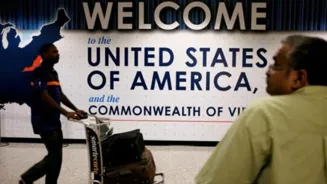In a clarfication statement, the department made it clear that all of the foreigners who currently hold valid US visas are subject to “continuous vetting” for any indication that they could be ineligible for the American visa, including those who are already admitted into the country.
They noted that if evidence of violation came to light, the visa would be revoked, and if the visa holder were in the US, they would be subjected to deportation.
“The State Department revokes visas any time there are indications of a potential ineligibility, which includes things like any indicators of overstays, criminal activity, threats to public safety, engaging in any form of terrorist activity, or providing support to a terrorist organisation,” a department spokesperson said.
People with 'anti-American views' are not allowed
The remarks from the State Department came after an announcement on Tuesday in which the Trump administration made it clear that it will look for “anti-American” views , including on social media, when assessing the applications of people wanting to live in the United States.
US Citizenship and Immigration Services (USCIS), which handles requests to stay in the US or become a citizen, noted that it would expand its vetting process to the social media postings of applicants and that “reviews for anti-American activity will be added to that vetting”.
“America’s benefits should not be given to those who despise the country and promote anti-American ideologies,” said a USCIS spokesperson, Matthew Tragesser. “US Citizenship and Immigration Services is committed to implementing policies and procedures that root out anti-Americanism and supporting the enforcement of rigorous screening and vetting measures to the fullest extent possible. Immigration benefits – including to live and work in the United States – remain a privilege, not a right.”
The government's crackdown on immigrants intensifies
Initially, the Trump administration said that it would focus only on dangerous criminals. However, thousands of people are being arrested daily. According to The New York Times, this week, the government is on track to deport 400,000 people in 2025.
Authorities have gone after working immigrants through unprecedented raids of restaurants, construction sites, and farms, which prompted protests in several cities across the country.
Earlier this week, the Department of State noted that it has revoked over
Of those, nearly 4,000 visas were revoked due to confirmed violations, and 200–300 were linked to terrorism or support for designated terrorist entities. Apart from this, the Trump administration had mandated in-person interviews for nearly all visa applicants and imposed other layers of scrutiny.
Hence, the current vetting expansion represents a significant escalation in post-issuance monitoring.














